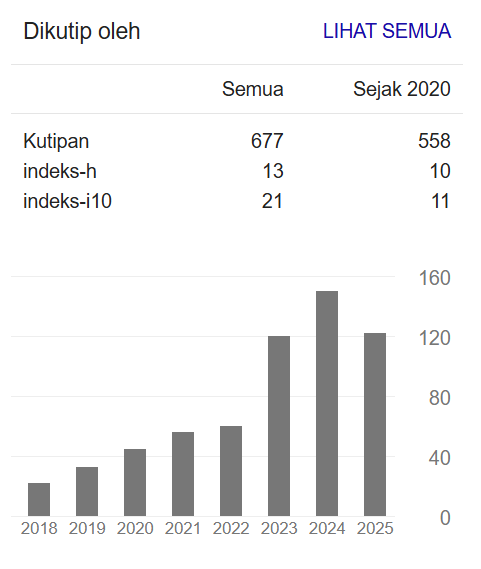MEMBACA VISI ILMU DAN TEKNOLOGI KONTEMPORER DARI SUDUT PANDANG FILSAFAT ISLAM
SUATU KEMUNGKINAN ELABORASI AWAL BERDASAR PENDEKATAN ‘IRFĀNI
DOI:
https://doi.org/10.20871/kpjipm.v7i2.185Keywords:
Ḥuḍūrī Science, ‘Irfāniyyah's Approach, NBIC, Vision of Science and TechnologyAbstract
This paper is a philosophical reflection on how the development of science and technology can be studied better through the tradition of Islamic philosophy. This is attempted because the approach that has been used to study science and technology in the Islamic world is still centered on the process of assimilation or Islamization of Knowledge. In a critical reading of the two approaches, the problems that arise from the study of contemporary science and technology become something that is difficult to anticipate. In fact, the development of science and technology is also moving very fast. This raises the question of the need for alternative approaches in the study of contemporary science and technology in the arena of Islamic Philosophy. To solve this problem, the author conducted an initial experiment that could elaborate ‘irfāniyyah's approach on the one hand with studies of contemporary science and technology on the other. This becomes possible with the reinterpretation of the concept of emanation that exists in the discourse of Yazdiyyah's ḥuḍūrī science. Based on this interpretation as well as the perspective that Miṣbāh Yazdi has made about the help of ‘irfān in philosophy, the application of the ‘irfāniyyah approach in the study of science and technology becomes possible as part of the practice of ḥuḍūrī science. On a more practical level, the author also uses this ‘irfāniyyah approach in a scenario format to read the vision of contemporary science and technology in the NBIC discourse.
Downloads
References
Abdullah, Muhammad Amin. 2003. “Pengembangan Metode Studi Islam dalam Perspektif Hermeneutika Sosial dan Budaya.” Tarjih: Jurnal Tarjih dan Pengembangan Pemikiran Islam 6 (1): 1–19. https://jurnal.tarjih.or.id/index.php/tarjih/article/view/6101.
Adamson, Peter. 2007. Al-Kindi. New York: Oxford University Press.
Alamad, Samir. 2017. Financial Innovation and Engineering in Islamic Finance. Cham: Springer.
Atighetchi, Dariusch. 2007. Islamic Bioethics: Problems and Perspectives. Dordrecht: Springer.
Bagheri, Alireza, dan Khalid Alali, ed. 2018. Islamic Bioethics: Current Issues and Challenges. Singapore: World Scientific Publishing.
Bainbridge, William Sims. 2007. Nanoconvergence: The Unity of Nanoscience, Biotechnology, Information Technology, and Cognitive Science. New Jersey: Prentice Hall.
Bar, Mohammed Ali Al-, dan Hassan Chamsi-Pasha. 2015. Contemporary Bioethics: Islamic Perspective. Cham: Springer.
Bergson, Henri. 1946. The Creative Mind. Diterjemahkan oleh Mabelle L. Andison. New York: Philosophical Library.
Bertens, Kees. 1981. Filsafat Barat dalam Abad XX. Jakarta: PT Gramedia.
Bostrom, Nick. 2013. “Existential Risk Prevention as Global Priority.” Global Policy 4(1): 15-31. 10.1111/1758-5899.12002.
Collingridge, David. 1980. The Social Control of Technology. London: Frances Pinter.
Cooper, Melinda. 2008. Life as Surplus: Biotechnology and Capitalism in the Neoliberal Era. Seattle: University of Washington Press.
Golshani, Mehdi. 2003. “Values and Ethical Issues in Science and Technology: A Muslim Perspective.” Islamic Studies 42 (2): 317-330. http://www.jstor.org/stable/20837273.
———. 2004. “Muṭahharī's Encounter with Modern Science.” Islamic Studies 43(2), 293-303. http://www.jstor.org/stable/20837345.
Hourani, George F., ed. 1975. Essays on Islamic Philosophy and Science. New York: State University of New York Press.
Iqbal, Zamir, dan Abbas Mirakhor. 2017. Ethical Dimensions of Islamic Finance: Theory and Practice. Cham: Palgrave Macmillan.
Jaberi, Mohammad Abed Al-. 2015. Problematika Pemikiran Arab Kontemporer . Diterjemahkan oleh Aksin Wijaya. Yogyakarta: Pustaka Pelajar.
Kouhsari, Sayyed Hosseini dan Muhammad Nur. 2013. “Hakikat ’Irfān.” Kanz Philosophia A Journal for Islamic Philosophy and Mysticism 3 (2):243-262.
Matsumoto, Yui, dkk. 2019. “Transcriptome Characterization of Reverse Development in Turritopsis dohrnii (Hydrozoa, Cnidaria).” G3: Genes, Genomes, Genetics 9 (12): 4127-4138. https://doi.org/10.1534/g3.119.400487.
Mohamed, Hazik, dan Hassnian Ali. 2019. Blockchain, Fintech, and Islamic Finance: Building the Future in the New Islamic Digital Economy. Boston/Berlin: Walter de Gruyter.
Mohamed, Hazik. 2021. Beyond Fintech: Technology Applications for the Islamic Economy. Singapore: World Scientific Publishing.
More, Max. 2013. “The Philosophy of Transhumanism.” Dalam The Transhumanist Reader: Classical and Contemporary Essays on the Science, Technology, and Philosophy of the Human Future, disunting oleh Maz More dan Natasha Vita- More. West Sussex: John Wiley & Sons.
Nasr, Seyyed Hossein. 1976. Islamic Science: An Illustrated Study. Kent: World of Islam Festival.
———. 2001. Science and Civilization in Islam. Chicago: ABC International Group.
Pisarchik, Leonid, dkk. 2020. “Bioethical Problems of the Development of NBIC Technologies and Opportunities of Humanitarian Evaluation.” Dalam Proceedings of 5th International Conference on Contemporary Education, Social Sciences and Humanities - Philosophy of Being Human as the Core of Interdisciplinary Research (ICCESSH 2020), 135–40. Moscow: Atlantis Press. https://doi.org/10.2991/assehr.k.200901.027.
Rajan, Kaushik Sunder. 2006. Biocapital: The Constitution of Postgenomic Life. Durham & London: Duke University Press.
Siswanto, Siswanto. 2013. “Perspektif Amin Abdullah Tentang Integrasi-Interkoneksi dalam Kajian Islam.” Teosofi: Jurnal Tasawuf dan Pemikiran Islam 3 (2): 376–409. https://doi.org/10.15642/teosofi.2013.3.2.376-409.
Soleh, A. Khudori. 2010. “Mencermati Epistemologi Tasawuf.” Ulumuna 14 (2): 227–48. https://doi.org/10.20414/ujis.v14i2.216.
Sulayman, Abdul Hamid Abu, ed. 1989. Islamization of Knowledge: General Principles and Work Plan. Herndon, VA: The International Institute of Islamic Thought (IIIT).
Takasato, Minoru, dan Melissa H Little. 2017. “Making a Kidney Organoid Using the Directed Differentiation of Human Pluripotent Stem Cells.” Dalam Organ Regeneration: 3D Stem Cell Culture & Manipulation, disunting oleh Takashi Tsuji. New York: Humana Press, 195-206.
Tenner, Edward. 1997. Why Things Bite Back: Technology and Revenge Effect. London: Fourth Estate.
Unus, Iqbal. J. 1983. “Towards The Assimilation Of Islamic Values In Scientific And Technological Developments”. Jurnal Teknologi 4 (1):9-26. https://doi.org/10.11113/jt.v4.928.
Vieira, Warren A., dkk. 2019. “Advancements to the Axolotl Model for Regeneration and Aging.” Gerontology 66 (3): 212-222. https://doi.org/10.1159/000504294.
Wang, Boya, dkk. 2019. “SIMD||DNA: Single Instruction, Multiple Data Computation with DNA Strand Displacement Cascades.” International Conference on DNA Computing and Molecular Programming 11648. https://doi.org/10.1007/978-3-030-26807-7_12.
Wiener, Norbert. 2019. Cybernetics: Or Control and Communication in the Animal and the Machine. Cambridge: Massachusetts: MIT Press.
Yazdi, Mehdi Ha’iri. 1994. Ilmu Hudhuri: Prinsip-Prinsip Epistemologi dalam Filsafat Islam. Bandung: Mizan.
Yazdi, Muhammad Taqi Mishbah. 2021. Kitab Filsafat: Pendekatan Komparatif Filsafat Islam. Diterjemahkan oleh Tim Penerjemah Sadra Press. Jakarta: Sadra Press.
Downloads
Published
How to Cite
Issue
Section
License
Copyright (c) 2021 Kanz Philosophia A Journal for Islamic Philosophy and Mysticism

This work is licensed under a Creative Commons Attribution-NonCommercial-ShareAlike 4.0 International License.





























